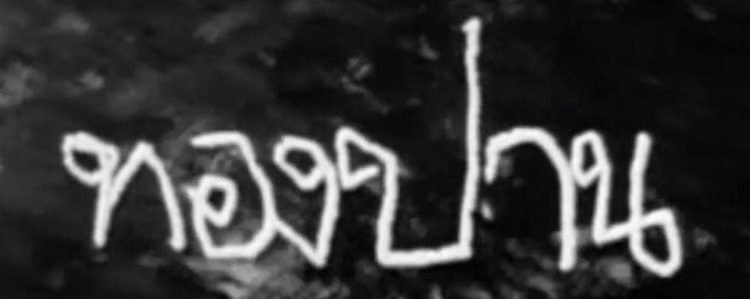
Next week, on 7th February, there will be a screening of the classic independent film Tongpan (ทองปาน) at Noir Row Art Space in Udon Thani. (Tongpan has previously been shown at Cinema Oasis in 2018, at the Bangkok Art and Culture Centre in 2017, and at the Thai Film Archive in 2016.)
Tongpan is a realistic dramatisation of a seminar that took place in 1975, which was organised to debate the construction of the Pa Mong dam on the Mekong river. The eponymous central character is a farmer who lost his land due to a previous dam. In the film, Sulak Sivaraksa makes an impassioned speech against the proposed dam: “Development only serves a few people in Bangkok... And what about the destruction of our country? The whole province of Loei will be flooded by this Pa Mong Dam.” Ultimately, the Pa Mong project was abandoned, though this was a Pyrrhic victory for environmental campaigners, as dozens of hydroelectric dams are currently under construction.
Tongpan was a product of the brief period of political freedom following the collapse of Thanom Kittikachorn’s dictatorship in 1973, though by the time filming had been completed in 1977, the military had seized power again, and the film was banned. Its prologue captures the optimism of 1973 (“A military junta fled into exile, and the students from the city went into the countryside to tell the farmers”), though this is contrasted by an epilogue that describes the return of military rule (“shortly after the shooting of this film, a violent coup d’etat of a magnitude never before seen in Thailand brought an end to Thailand’s three-year experiment with democracy”).
Tongpan is a realistic dramatisation of a seminar that took place in 1975, which was organised to debate the construction of the Pa Mong dam on the Mekong river. The eponymous central character is a farmer who lost his land due to a previous dam. In the film, Sulak Sivaraksa makes an impassioned speech against the proposed dam: “Development only serves a few people in Bangkok... And what about the destruction of our country? The whole province of Loei will be flooded by this Pa Mong Dam.” Ultimately, the Pa Mong project was abandoned, though this was a Pyrrhic victory for environmental campaigners, as dozens of hydroelectric dams are currently under construction.
Tongpan was a product of the brief period of political freedom following the collapse of Thanom Kittikachorn’s dictatorship in 1973, though by the time filming had been completed in 1977, the military had seized power again, and the film was banned. Its prologue captures the optimism of 1973 (“A military junta fled into exile, and the students from the city went into the countryside to tell the farmers”), though this is contrasted by an epilogue that describes the return of military rule (“shortly after the shooting of this film, a violent coup d’etat of a magnitude never before seen in Thailand brought an end to Thailand’s three-year experiment with democracy”).
